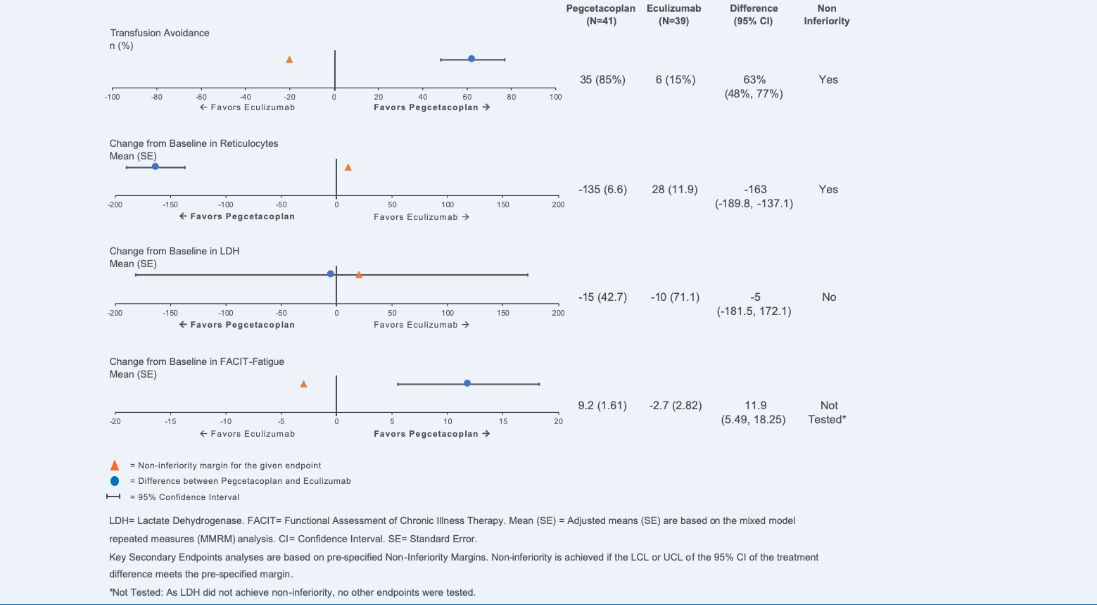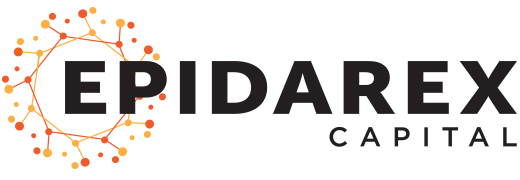- Pegcetacoplan met the primary endpoint in the PEGASUS study, demonstrating superiority to eculizumab (p<0.0001) with an improvement in adjusted means of 3.8 g/dL of hemoglobin at week 16
- Safety profile of pegcetacoplan was comparable to eculizumab in this study
- Conference call scheduled today at 8:30 a.m. ET
WALTHAM, Mass., Jan. 07, 2020 (GLOBE NEWSWIRE) — Apellis Pharmaceuticals, Inc. (Nasdaq: APLS), a global biopharmaceutical company pioneering targeted C3 therapies, today announced positive results from the Phase 3 PEGASUS study evaluating pegcetacoplan (APL-2) in adults with paroxysmal nocturnal hemoglobinuria (PNH). Top-line data show that pegcetacoplan met the study’s primary efficacy endpoint, demonstrating superiority to eculizumab with a statistically significant improvement in adjusted means of 3.8 g/dL of hemoglobin at week 16 (p<0.0001). At week 16, pegcetacoplan-treated patients (n=41) had an adjusted mean hemoglobin increase of 2.4 g/dL from a baseline of 8.7 g/dL, compared to eculizumab-treated patients (n=39) who had a change of -1.5 g/dL from a baseline of 8.7 g/dL.
Additionally, pegcetacoplan showed promising results in key secondary endpoints. Pegcetacoplan met non-inferiority on transfusion avoidance and absolute reticulocyte count. Pegcetacoplan also showed positive trends on lactate dehydrogenase (LDH) and fatigue as measured by the Functional Assessment of Chronic Illness Therapy (FACIT)-fatigue score.
Key Secondary Endpoints Analysis
View full table by clicking on the image or link below:

“Pegcetacoplan is the first and only investigational therapy to demonstrate superiority compared to eculizumab on hemoglobin levels. We are also excited to see that 85% of patients treated with pegcetacoplan were transfusion free,” said Federico Grossi, M.D., Ph.D., Chief Medical Officer of Apellis. “At Apellis, we are focused on developing groundbreaking therapies, and these results show that pegcetacoplan has the potential to transform the lives of people with PNH. We look forward to meeting with regulators in the first half of the year to discuss next steps.”
“The majority of patients with PNH currently receiving treatment with eculizumab have continuing anemia,” said Peter Hillmen, M.B., Ch.B., Ph.D., Professor of Experimental Hematology at the University of Leeds and an investigator in the PEGASUS study. “The PEGASUS results show that pegcetacoplanhas the potential to become a new standard of care for patients with PNH.”
In this study, the safety profile of pegcetacoplan was comparable to eculizumab. Seven of 41 patients (17.1%) in the pegcetacoplan group experienced a serious adverse event (SAE), and 6 of 39 patients (15.4%) in the eculizumab group experienced SAEs. No cases of meningitis and no deaths were reported in either treatment group. The most common adverse events reported during the 16-week, randomized, controlled treatment period in the pegcetacoplan and eculizumab groups, respectively, were injection site reactions (36.6% vs. 2.6%), diarrhea (22.0% vs. 0%), headache (7.3% vs. 20.5%) and fatigue (4.9% vs. 15.4%). Another common adverse event was hemolysis, which was reported in four patients in the pegcetacoplan group (9.8%) and nine patients in the eculizumab group (23.1%). This led to the three discontinuations in pegcetacoplan group.
All patients who completed the randomization period in both groups (77/80) entered the 32-week open-label pegcetacoplan treatment period.
“Going into the study, our most optimistic expectation was to see a 2 g/dL or more change in hemoglobin and a trend on the key secondary endpoints. Needless to say, we are thrilled with these results,” said Cedric Francois, M.D., Ph.D., Co-Founder and Chief Executive Officer of Apellis. “These data give us strong confidence in the further development of pegcetacoplan as a targeted C3 inhibitor in geographic atrophy and other serious complement-driven diseases.”
Detailed results from the PEGASUS study will be presented at a future scientific meeting.
Conference Call and Webcast
Apellis will host a conference call and webcast to discuss the results of the PEGASUS Phase 3 clinical study today, January 7 at 8:30 a.m. ET. To access the live call by phone please dial 866-774-0323 (domestic) or 602-563-8683 (international); the conference ID is 4199692. A live audio webcast of the event and accompanying slides may also be accessed through the “Events and Presentations” page of the “Investors and Media” section of the company’s website at http://investors.apellis.com/events-and-presentations. A replay of the webcast will be available for 30 days following the event.
About Paroxysmal Nocturnal Hemoglobinuria (PNH)
PNH
is a rare, chronic, life-threatening blood disorder associated with
abnormally low hemoglobin levels due to the destruction of
oxygen-carrying red blood cells (hemolysis). Persistently low hemoglobin
can result in frequent transfusions and debilitating symptoms such as
severe fatigue and difficulty breathing (dyspnea). Retrospective studies
show that, even on eculizumab, approximately 70% of people with PNH
have low hemoglobin levels,1,2 and 36% require one or more transfusions a year.3
About the PEGASUS Study
The PEGASUS study (APL2-302; NCT03500549) is a multi-center, randomized, open-label, active-comparator controlled Phase 3 study in 80 adults with PNH. The primary objective of this study was to establish the efficacy and safety of pegcetacoplan compared to eculizumab. Participants must have been on eculizumab (stable for at least 3 months) with a hemoglobin level of <10.5 g/dL at the screening visit. During the four-week run-in, patients were dosed with 1080 mg of pegcetacoplan twice weekly in addition to their current dose of eculizumab. During the 16-week randomized, controlled period, patients were randomized to receive either 1080 mg of pegcetacoplan twice weekly or their current dose of eculizumab. All participants completing the randomized controlled period entered the open-label pegcetacoplan treatment period where they received pegcetacoplan, regardless of the prior treatment received in the randomized, controlled period.
Key secondary endpoints were tested in a hierarchical manner after statistical significance was reached for the primary endpoint. Key secondary endpoints were tested first for non-inferiority and, if all were met, then superiority was tested sequentially for transfusion avoidance, absolute reticulocyte count, and FACIT-fatigue score. Once one hypothesis was tested as not significant, all subsequent tests were not assessed. Estimates were computed for all key secondary and secondary endpoints regardless of whether a hypothesis was tested.
The study was conducted in collaboration with SFJ Pharmaceuticals, who supported the development of pegcetacoplan in PNH. SFJ is a global drug development company, which provides a unique and highly customized co-development partnering model for the world’s top pharmaceutical and biotechnology companies.
About Pegcetacoplan (APL-2)
Pegcetacoplan
is an investigational, targeted C3 inhibitor designed to regulate
excessive complement activation, which can lead to the onset and
progression of many serious diseases. Pegcetacoplan is a synthetic
cyclic peptide conjugated to a polyethylene glycol polymer that binds
specifically to C3 and C3b. Apellis is evaluating pegcetacoplan in
several clinical studies including paroxysmal nocturnal hemoglobinuria
(PNH), geographic atrophy (GA), and C3 glomerulopathy. Pegcetacoplan was
granted Fast Track designation by the U.S. Food and Drug Administration
(FDA) for the treatment of PNH and the treatment of GA. For additional
information regarding our clinical trials, visit www.apellis.com/clinical-trials.html.
About Apellis
Apellis Pharmaceuticals, Inc. is a global biopharmaceutical company that is committed to leveraging courageous science, creativity, and compassion to deliver life-changing therapies. By pioneering targeted C3 therapies, we aim to develop best-in-class and first-in-class therapies for a broad range of debilitating diseases that are driven by uncontrolled or excessive activation of the complement cascade, including those within hematology, ophthalmology, and nephrology. For more information, please visit http://apellis.com.
Apellis Forward-Looking Statement
Statements in this press release about future expectations, plans and prospects, as well as any other statements regarding matters that are not historical facts, may constitute “forward-looking statements” within the meaning of The Private Securities Litigation Reform Act of 1995. These statements include, but are not limited to, statements relating to the implications of preliminary clinical data. The words “anticipate,” “believe,” “continue,” “could,” “estimate,” “expect,” “intend,” “may,” “plan,” “potential,” “predict,” “project,” “should,” “target,” “will,” “would” and similar expressions are intended to identify forward-looking statements, although not all forward-looking statements contain these identifying words. Actual results may differ materially from those indicated by such forward-looking statements as a result of various important factors, including: whether preliminary or interim results from a clinical trial will be predictive of the final results of the trial; whether results obtained in preclinical studies and clinical trials such as the results reported in this release will be indicative of results that will be generated in future clinical trials; whether pegcetacoplan will successfully advance through the clinical trial process on a timely basis, or at all; whether the results of the Pegasus or other clinical trials will be sufficient to form the basis of regulatory submissions, whether the Company’s clinical trials will warrant regulatory submissions and whether pegcetacoplan will receive approval from the United States Food and Drug Administration or equivalent foreign regulatory agencies for GA, PNH, C3G or any other indication; whether, if Apellis’ products receive approval, they will be successfully distributed and marketed; and other factors discussed in the “Risk Factors” section of Apellis’ Quarterly Report on Form 10-Q filed with the Securities and Exchange Commission on November 5, 2019 and the risks described in other filings that Apellis may make with the Securities and Exchange Commission. Any forward-looking statements contained in this press release speak only as of the date hereof, and Apellis specifically disclaims any obligation to update any forward-looking statement, whether as a result of new information, future events or otherwise.
1. Risitano AM, Marotta S, Ricci P, et al. (2019) Anti-complement Treatment for Paroxysmal Nocturnal Hemoglobinuria: Time for Proximal Complement Inhibition? A Position Paper From the SAAWP of the EBMT. Front. Immunol. 10:1157. doi: 10.3389/fimmu.2019.01157.
2. Risitano AM, Notaro R, Marando L, et al. (2009) Complement fraction 3 binding on erythrocytes as additional mechanism of disease in paroxysmal nocturnal hemoglobinuria patients treated by eculizumab. Blood. 2009 Apr 23;113(17):4094-100.
3. McKinley C. Extravascular Hemolysis Due to C3-Loading in Patients with PNH Treated with Eculizumab: Defining the Clinical Syndrome. Blood. 2017;130:3471.
Click here to view the original press release.
